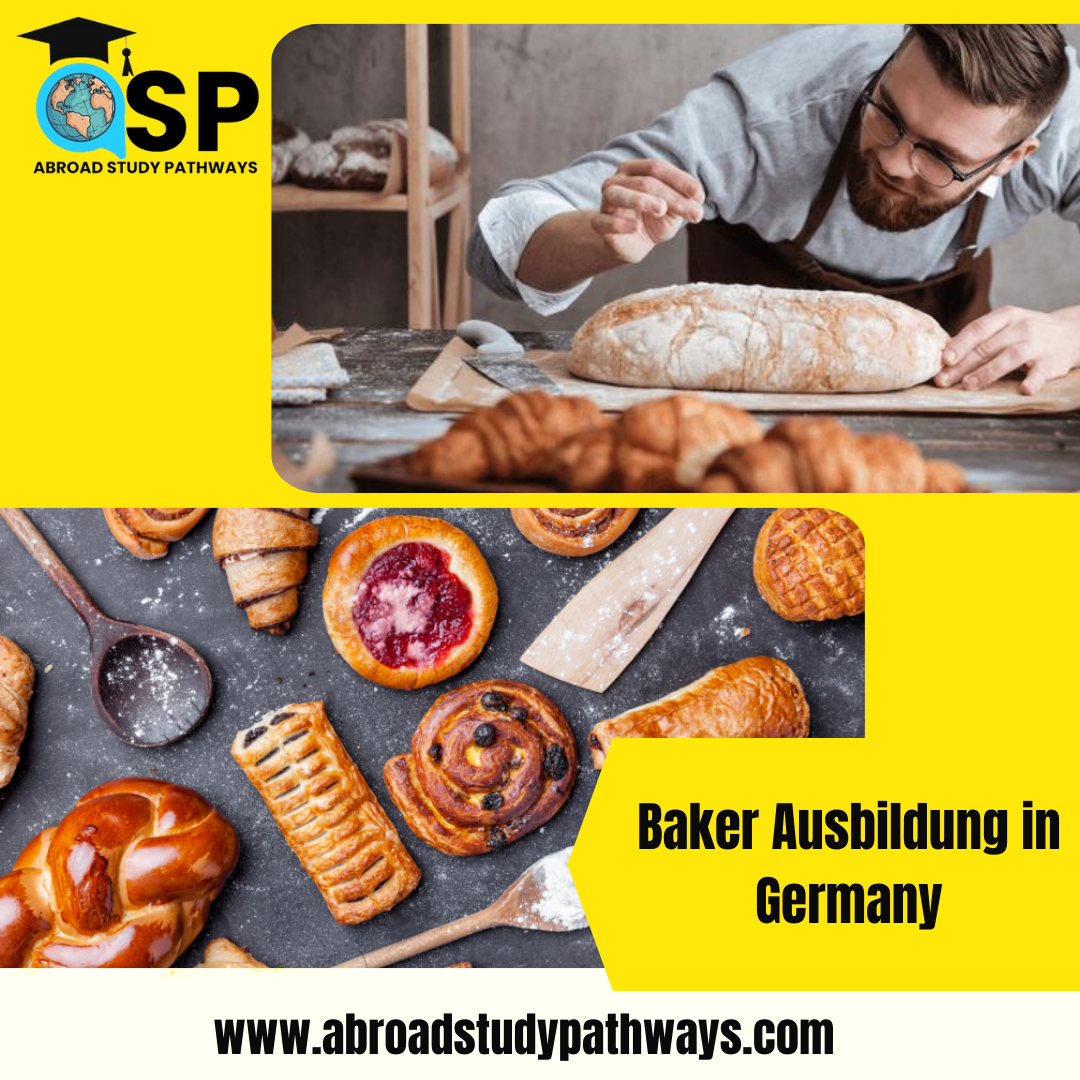The “Baker Ausbildung” in Germany is a vocational training program that actively prepares individuals to become bakers. Moreover, it is a program where participants actively learn and acquire the necessary skills and knowledge in the field of baking.
Through practical training and theoretical instruction, aspiring bakers actively engage in activities such as dough preparation, baking techniques, pastry making, recipe development, food safety, and customer service. Additionally, this program actively equips individuals with the expertise and hands-on experience needed to pursue a successful career as a baker in Germany.

Understanding Baker Ausbildung in Germany
1) What is Baker Ausbildung in Germany?
In Germany, the “Baker Ausbildung” program actively trains individuals who aspire to become professional bakers. This vocational training pathway offers comprehensive education in the art and science of baking, equipping students with the necessary skills and knowledge. Additionally, they acquire expertise in ingredients, recipe development, food hygiene, and quality control. Combining theoretical instruction with practical hands-on experience, the Baker Ausbildung program enables students to develop a solid foundation in the baking industry. Throughout the program, participants actively learn various skills and techniques essential for bread and pastry production, such as dough preparation, shaping, fermentation, baking, and decorating. By actively participating in this program, individuals can pursue rewarding careers as skilled bakers.
2) Requirements for Baker Ausbildung in Germany?
- Completion of compulsory education: Applicants must have successfully completed their mandatory schooling.
- Enrollment in a vocational school: Transitioning from compulsory education, individuals need to enroll in a vocational school offering a baker apprenticeship program.
- Obtaining an apprenticeship contract: Prospective bakers must secure an apprenticeship contract with a bakery or pastry shop. This agreement will serve as the foundation for their practical training.
- Meeting age criteria: Candidates must be at least 16 years old to start their apprenticeship.
- Physical fitness: As baking involves manual labor and long hours on one’s feet, applicants should possess adequate physical fitness.
- Good health: It is essential to provide a medical certificate verifying that the individual is in good health and free from any contagious diseases.
- Basic German language skills: Fluent communication in the German language is necessary to understand instructions, safety protocols, and interact with customers.
- Aptitude test: Some vocational schools or potential employers may require candidates to pass an aptitude test assessing their manual dexterity, attention to detail, and math skills.
- Residency permit: Non-EU/EEA applicants must possess a valid residency permit allowing them to undertake vocational training in Germany.
- Strong work ethic and motivation: A strong commitment to learning the trade, enthusiasm for baking, and a diligent work ethic are highly valued by employers and schools.
Duration and Modules
The baker apprenticeship in Germany typically lasts for a duration of three years. During this period, apprentices gain practical experience and theoretical knowledge necessary for a successful career in baking. Upon completion, apprentices can transition into professional roles as skilled bakers.
Common Modules Studies in Institution
Over the course of three years, apprentices will undergo a structured curriculum that covers everything from the basics of dough preparation to the intricacies of artisan bread making and bakery management.
1st Year Apprenticeship
- Introduction to Baking Basics: Apprentices learn fundamental principles of baking. Emphasis on understanding ingredients and their roles in baking. Introduction to basic equipment and tools used in baking.
- Dough Preparation: Techniques for preparing different types of dough, including yeast dough, pastry dough, and batter. Hands-on practice in kneading, shaping, and proofing dough.
- Mixing Techniques: Instruction on various mixing methods such as creaming, folding, and beating. Understanding how mixing affects the texture and consistency of baked goods.
- Ingredient Properties: In-depth exploration of common baking ingredients like flour, sugar, fats, and leavening agents. Understanding how ingredient properties impact the outcome of baked goods.
2nd Year Apprenticeship
- Pastry Making: Apprentices learn the art of pastry making, including techniques for puff pastry, short crust pastry, and filo pastry. Emphasis on precision and finesse in pastry creation.
- Cake Decorating: Instruction on cake decorating techniques, including icing, piping, and fondant work. Creative exploration of various cake designs and themes.
- Baked Goods Variety: Expanding repertoire to include a wide range of baked goods such as cookies, tarts, and eclairs. Focus on presentation and flavor balancing.
3rd Year Apprenticeship
- Advanced Baking Techniques: Delving into advanced baking methods such as sourdough fermentation, laminated doughs, and mousse making. Mastery of intricate techniques to elevate baking skills.
- Artisan Breads: Specialized training in crafting artisanal breads, including sourdough, ciabatta, and baguettes. Understanding the science behind bread fermentation and dough development.
- Bakery Management: Introduction to bakery operations, including inventory management, pricing strategies, and customer service. Developing skills in team leadership and workflow optimization.
- Industry Understanding: Exploration of current trends and innovations in the baking industry. Discussion on sustainability, food safety regulations, and market analysis.
Average Salary
In the first year of training, the monthly gross salary is set at 620 euros, while in the second year, it increases to 732 euros. As for the third year of training, there will be a further increase in the gross salary to 837 euros (beginning of training: 2023).
| Duration of Apprentice | Average Salary |
| 1st year | € 850 – 1100 |
| 2nd year | € 950 – 1200 |
| 3rd year | € 1050 – 1500 |
Pathways to Become a Baker Ausbildung in Germany
- Choose a reputable bakery or culinary institute to pursue a career as a baker apprentice.
- Enroll in a formal apprenticeship program, which typically involves a combination of classroom instruction and on-the-job training.
- Acquire fundamental baking skills by working under the guidance of experienced bakers.
- Develop a solid foundation in baking techniques, such as dough preparation, pastry making, and cake decorating.
- Gradually assume more responsibilities, allowing for practical experience and skill development.
- Take advantage of training opportunities to enhance knowledge in areas such as food safety and sanitation practices.
- Seek mentorship from seasoned bakers to gain valuable insights and learn advanced techniques.
- Stay updated with industry trends and new baking methods through workshops, seminars, and professional networking events.
- Demonstrate commitment and a strong work ethic, showing dedication to the craft of baking.
- Successfully complete the required duration of the apprenticeship program, meeting all performance and evaluation criteria.
- Obtain necessary certifications or licenses, if applicable, to enhance career prospects and credibility as a specialized baker apprentice.
- Transition into a professional role as a specialized baker, leveraging the skills and knowledge gained during the apprenticeship.
Companies that provide this Baker Apprenticeship
There are various companies that provides training in Bakery and other related fields. Some of the popular companies are:
- BAKER and BAKER Germany Gmbh
- Baker Görtz GmbH
- Max Rischart’s Backhaus KG
the Baker Ausbildung program in Germany actively prepares individuals for a successful career in baking by providing comprehensive training in both practical and theoretical aspects of the field. Through hands-on experience and classroom instruction, students develop essential skills in dough preparation, baking techniques, pastry making, and customer service. The program spans three years, equipping apprentices with the expertise and knowledge needed to excel as skilled bakers in the industry.

